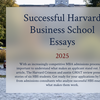The wise concentrator, however, will do well to take a good deal more than the minimum number of courses, since when it comes time for evaluating one's grades for graduation honors, the department considers the six highest grades only. Thus the more courses one takes the better the chance to pile up six A's. Nevertheless History is an ideal field for a man who is not definitely sure of what he is aiming for after graduation. It also has a fairly large number of pre-meds who do not want to major in the sciences, but who can not meet the more rigid requirements of other fields.
History will also be able to offer the incoming sophomore an extensive tutorial program. Under the system going into effect next fall for the first time, every sophomore in the field will be required to take tutorial which will be given by a tutor in his House to a group no larger than six men. Chairman C. Crane Brinton '19 says that individual tutors will be allowed considerable liberty in specific assignments, but that the whole sophomore tutorial program will be based on some central idea, possibly the great historical writers from Thucydides on. In the junior and senior years concentrators will be allowed to follow their own interests to a greater extent, and non-honors men will not have tutorial at all. Honors candidates, about 40 percent of the field, also have to take general examinations at the end of the junior year, specials in the senior, and write a thesis.
Many Fields
History is sub-divided into a multitude of special fields, of which American History since 1789 is by far the most popular. Of the 170 concentrators in the present senior class, 72 are in that branch, 53 in Europe since 1789, 12 in American Colonial, and the rest scattered among the other groups.
So far as courses are concerned, the department requires none, although it does recommend Social Sciences 1. The big courses are well-taught by well-known men--Brinton, Taylor, Schlesinger, Owen, Fairbank, Merk, and many others are all stimulating lecturers. Next year's offerings seem particularly scant, however; especially in the two biggest fields. H. Stuart Hughes, Donald McKay, and Myron Gilmore will be away for at least a part of next year, and no completely new Modern European courses are being offered. In modern American History Assistant Professor Leuctenburg will be off to Columbia, and no new men will be added. Only in the field of Medieval History will the department have strengthened itself over the summer.
Linguistics
Number of Concentrators: 12.
1951 Commencement Honors: cum, 2; magna, 1; summa, 0.
Language for the sake of language is the watchword of the Linguistics department, which is headed by the nation's top authority in the field, Professor Joshua Whatmough. Whatmough feels that if one has learned the structure of a language, reading the great literature in it is a simple matter. Language as a science is of interest mainly to those thinking of an academic career, but diplomatic and business careers could also be helped by the solid language background the field offers.
Linguistics is open to honors candidates only; to enter it one must have had an intensive high school language course and there is tutorial for juniors and seniors. For concentration two courses labeled Linguistics, two straight language courses, and two more from related fields are required, but most men in the field take more.
Mathematics
Number of Concentrators: 100.
1951 Commencement Honors: cums, 2; magnas, 5; summas, 0.
Concentration in math appeals to two types of students. Those who like to take their thinking clear and cold enjoy the exactness and rigorous logic of the field. The more practically minded benefit from math's peculiar applicability to other fields -- especially, statistics, physics and the applied sciences.
The Math Department makes sure to cater to both types. The "math for math's sake" addicts can find a wide range of theoretical courses, and an excellent library in the department's own Vanserg building. The wide range of related courses the department allows to count for concentration are a boon to the more "practical" mathematicians, as is a new course in elementary statistics, Math 1c, to be given next year.
Read more in News
Dunces Elect












